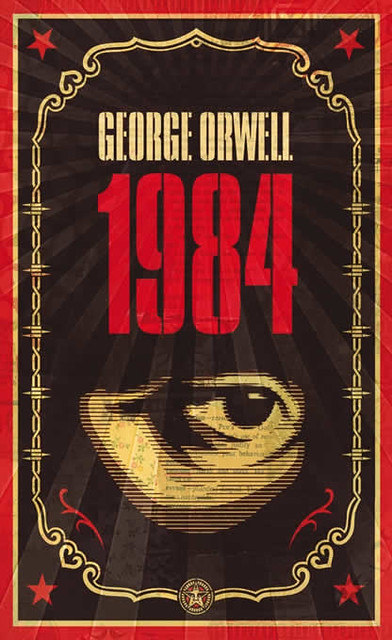In order to understand the intent of the novel “1984,” written by George Orwell in 1949, we must look at the context of the time period in which it was written. When doing this, the book transforms from being just a collection of dystopian elements into a literary and political masterpiece of cautionary storytelling. Orwell was a brilliant writer by nature who was shaped by the world he was born into, and it’s not difficult to see where the fragments came from that were pieced together in his satirical, sinister nightmare of “1984.”
Orwell did not title the book as a prediction for the exact moment when the world would become dystopian and individual freedoms would be destroyed. The world of “1984” had taken the decades after World War Two to evolve into the society pictured in the novel. The meaning of the title, then, can symbolize the alarming threat that Orwell believed could potentially happen. To understand how a world can become like that of “1984’s,” where elements such as “thought crime,” “thought police” and mass surveillance are commonplace, looking for clues in Orwell’s lifetime can be the key.
With a mustache described similarly to that of Joseph Stalin, Big Brother is the ominous leader of “the Party,” and is never physically seen. In Orwell’s lifetime, Stalin introduced economic policies in 1928 as president of the Soviet Union, titled the Five-Year Plans. This first five-year plan was “achieved” in just four, inciting propaganda posters including, “2+2=5.” These posters were littered with indoctrination and information, which looking back, were glaring lies. They boasted the successful collectivization of agriculture and the expansion of their industry. However, today, this time period in the Soviet Union is known for famines which killed millions and the perpetually ascending work quotas in its industrial factories.
Orwell also fought in the Spanish Civil War, greatly influencing his political beliefs. In his 1940 work, “My Country Right or Left,” he described newspaper reports as having “great battles reported where there had been no fighting, and complete silence where hundreds of men had been killed… I saw newspapers in London retailing these lies and eager intellectuals building emotional superstructures over events that had never happened.” Remembering the protagonist, Winston Smith’s occupation of manufacturing new history and erasing the old, can be startling when looking at these real examples of which Orwell was aware.
When looking from Orwell’s point of view, in this time period, the inspiration for much of “1984” and its world-development is much more lucid. This context also addresses the fact that many readers have been misinterpreting “1984” and the relevance of its messages and themes. In contrast to all of this, I would like to say the opposite of what has been frequently said already, and give ourselves at least a little appreciation for not transforming our world into that of “1984’s.”
Consequently, “1984” is a warning, not specifically for the outcome of the cult of personality of “Big Brother,” but for the very beginning of the development of totalitarianism.
I don’t mean that there are no dangerous and miserable examples which are shockingly similar to the novel. North Korea is in a constant state of unmoving war with South Korea. The elections there have a 100% voter turnout rate, all for Kim Jong Un. Language in Russia today is restrictive, where ironically, citizens are being detained for quoting or handing out copies of “1984.” The United States itself shares some similarities with “doublethink,” where some Americans blindly follow the direction of powerful individuals, not thinking for themselves as well as living in complete ignorance of the mistruths of the past by the exact same people.
It’s possible these resemblances are coincidence, or Orwell had divine influence to predict the future. What’s more likely is that due to Orwell’s keen observations of the politics of the 20th century, he was able to pick up on patterns in the human development of government. Consequently, “1984” is a warning, not specifically for the outcome of the cult of personality of “Big Brother,” but for the very beginning of the development of totalitarianism. The difference is that the end result in the world of “1984” contains language like thought police and thoughtcrime, which can be misread for the impression that these elements in a world can happen at any moment.
According to a 1949 letter from George Orwell to an American trade union leader, he didn’t “believe that the kind of society I describe will necessarily arrive, but I believe (allowing, of course, for the fact that the book is a satire) that something resembling it could arrive…” I take this to mean that the little things, what we brush off at times, are the real unnerving pieces. As explained by Orwell, elements have “been partly realisable in communism and fascism,” which is strictly why looking back to history is so important; to know what to look for.
Glaring lies from powerful individuals. Ignorance to indisputable facts. The corruption of power. Every one of these are components leading down the path to totalitarianism and the deprivation of humanity. If there is one thing to take away within the striking words of “1984”, it’s that whoever “controls the past controls the future. Who controls the present controls the past.”





































